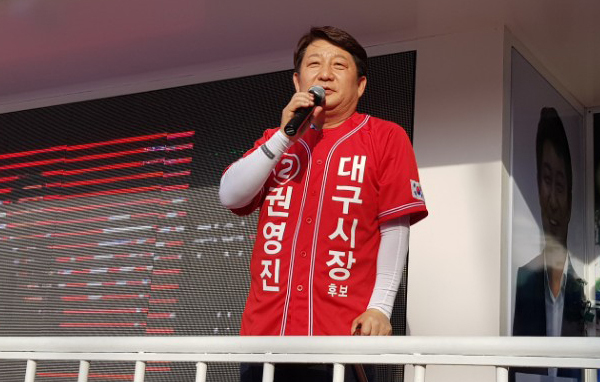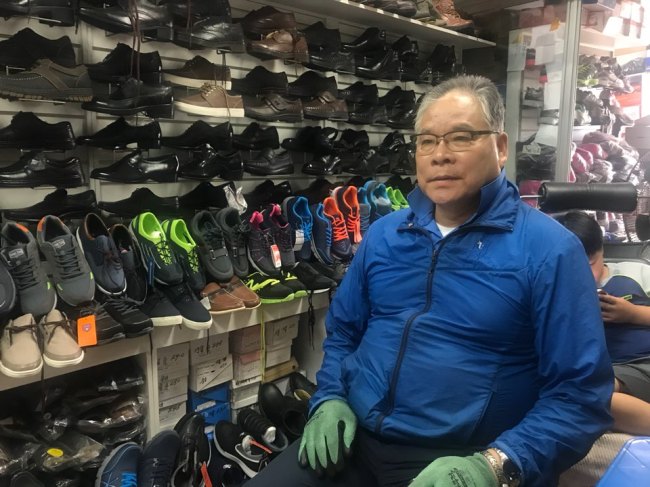DAEGU -- Just a week before South Korea’s upcoming local elections, Daegu mayor hopeful Kwon Young-jin of the major conservative opposition Liberty Korea Party running for re-election was campaigning at a local marketplace in Hyeonpung-myeon, Daegu.
Kwon is competing in a three-way mayoral race slated for June 13, which includes Lim Dae-yun of the ruling liberal Democratic Party of Korea.
 |
Daegu mayor hopeful Kwon Young-jin of the major conservative opposition Liberty Korea Party. Yonhap |
In the traditionally conservative stronghold, some 300 kilometers southeast of Seoul, Kwon did the typical rounds of handshakes and hugs for public show on Tuesday, trying to appeal to the voters.
Only, this time, Kwon seemed more desperate.
With a sluggish support rate, the incumbent mayor aiming for a second term faces an outcome that would not have been thought possible for a conservative candidate in the region: Losing the race.
According to political pollster Research and Research‘s survey of 1,004 Daegu voters last week, Kwon enjoyed the most support to become the next mayor in Daegu at 34.4 percent, but Lim follows closely behind at 29.6 percent.
The survey result is a disappointment to the right-leaning party considering the fact that in almost every election in the region, the voters had traditionally supported the right.
In the 2012 presidential election, for example, nearly 81 percent of the voters in Daegu -- and upper North Gyeongsang Province -- voted for then-conservative candidate Park Geun-hye who won the presidency. The regions’ voters who had given undying loyalty to Park then saw Park end up in jail, found guilty of power abuse and coercion.
The ex-leader, who was removed from office early last year, triggered some of the 5.1 million voters of the two regions to view the conservative party with mixed feelings of anger and disappointment, according to people interviewed by The Korea Herald.
“I’ve never supported the left, or President Moon, but this time, I might consider voting for the left-leaning party in the local elections,” said Kwon Sung-yong, 62, who sells shoes at the Hyeonpung market in Daegu.
 |
Kwon Sung-yong, 62, who works at the Hyeonpung market in Daegu, a conservative stronghold, tells The Korea Herald on Wednesday that he will no longer support the right. Bak Se-hwan/The Korea Herald |
“The Liberty Korea Party needs reform or will of change to become the true conservative party. Until then, I will suspend my support,” Kim said.
Lee In-ok, 66, another shop owner at the market, said she had been an admirer of both former President Park and her late father, Park Chung-hee, who seized power in a military coup in 1961 and was assassinated in 1979.
“Park turned out to be a corrupt leader and ruined the legacy of her father who strove to bring the prosperity now enjoyed by people today. Nevertheless, Park’s party (former Saenuri, now rebranded the Liberty Korea Party) failed to carry out a powerful reform even after it lost the presidential race last year,” Lee said.
The change in sentiment among right-leaning voters here is most evident in younger generations, according to Kim hyung-jin who runs a local restaurant near the market.
“For me, it’s a generational matter,” said the 59-year-old restaurant owner. “My father and I have always supported the right. I still believe the conservatives should all move beyond the Park scandal and unite again to fight against the liberal administration. My kids think the opposite, saying the conservative party is corrupt just like the ousted Park,” Kim said.
“I always hated the idea that people in Daegu always support the right no matter what happens,” said Park Su-min, a 27-year-old college student.
“That’s only true in my parents’ generation, not us,” Park added.
The liberal Democratic Party, on the other hand, is hoping that the already changing political landscape could flip in Daegu as they enjoy high approval ratings in most of the regions across the country. Now aided by high public support for President Moon Jae-in due to the recent conciliatory mood on the Korean Peninsula following his summit with the North‘s leader in late April, the ruling party anticipates that the nationwide elections could lead to a landslide victory.
In regards to the change in sentiment in the conservative stronghold and the possibility that the Liberty Korea Party might not win Daegu, a party official said they are still confident in the competition against liberal Lim.
“The high approval rating for the ruling Democratic Party of Korea doesn’t necessarily mean that people will also vote for Lim,” Kwon’s chief vice-spokesman Son Kang-ho said.
“The focus in the local elections should be on individual candidates and their policies, not their party’s popularity. The gap between the two will grow wider until the election day as our candidate will continue to engage in the public gatherings to promote what he will do for the people of Daegu,” Son said.
Bae Jong-chan, Research and Research’s chief director, said several factors have contributed to the majority of Daegu residents seeming less supportive of the right.
“For one thing, young conservatives support the right far more half-heartedly than their parents and grandparents did, or not support them at all. Such sentiment became further reinforced after former President Park was removed from office for massive corruption, gravely wounding the pride of Daegu residents,” Bae said.
In the quadrennial local elections, candidates are competing for seats of 17 chiefs of provinces and metropolises, 226 heads of smaller administrative units and other seats in provincial and metropolitan assemblies, lower-level local councilors and superintendents of education.
Daegu and North Gyeongsang Province are two of the small number of regions where candidates from the conservative opposition might secure victory, according to recent public polls.
By Bak Se-hwan (
sh@heraldcorp.com)









![[Today’s K-pop] Blackpink’s Jennie, Lisa invited to Coachella as solo acts](http://res.heraldm.com/phpwas/restmb_idxmake.php?idx=644&simg=/content/image/2024/11/21/20241121050099_0.jpg)